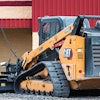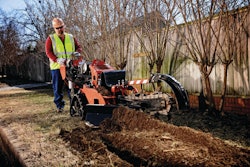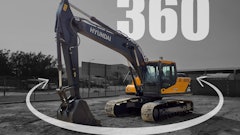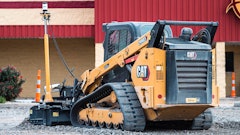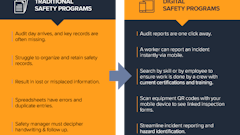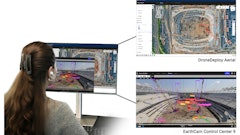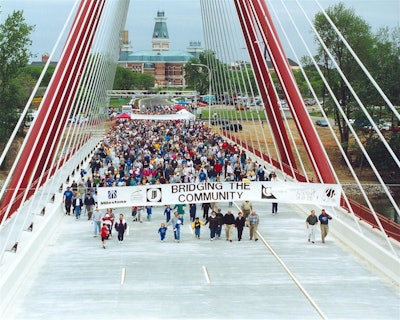
It’s an unfortunate aspect of our industry – many communities, despite deteriorating roads, don’t want an asphalt plant near it. The old acronym, NIMBY - Not In My Back Yard – needs to move over for the next generation, BANANA – Build Absolutely Nothing Anywhere Near Anybody.
On a weekly basis, you can find headlines regarding communities rejecting new asphalt plants or even the expansion of an asphalt plant that’s been in the neighborhood for decades.
“If you type ‘asphalt plant’ and ‘environment’ into Google, look at how many hits you get – hundreds of thousands,” Robert J. Beyke, manager of environmental affairs with Milestone Contractors, L.P. said during a recent Addressing Community Concerns with Asphalt Plants educational session at the World of Asphalt in Baltimore. “There are many examples of asphalt plants coming under attack for their perceived environmental impacts.”
Based in Indianapolis, IN, Milestone Contractors provides both asphalt and concrete paving, excavation and utility construction as well as bridge construction. The company was created in 1994 as a merger of several smaller construction companies. Each of the smaller companies had been family-owned, community-based businesses in which the owners and companies were well-known and active within their communities, says Beyke.
Milestone is a wholly-owned subsidiary of The Heritage Group, which is itself a family-owned company in which the owner family is actively engaged in charitable and community activities.
“Being involved in the local community impacts the company in multiple ways,” says Beyke. “Some of these include: long-term employee retention; employees who enjoy and are proud to work for Milestone; a feel of working in a smaller, close-knit company; and an awareness for others in the community of what Milestone believes in and stands for.
“Each of these -- while not the reason we are involved in our communities -- help positively impact the bottom line of the company,” he says.
Creating a community awareness program
Positive community relations are important to an asphalt plant, not just to be a good neighbor and support the area where you work and live, but to also monitor and detect when and where any opposition may be forming against your company. In this way, you can develop an early-warning system and get out in front of the problem.
There are various common complaints – noise, odor, visible air emissions, traffic, dust, etc. – that locals might choose to focus on. “The main goal in creating a community awareness program is to build trust with those in your community so they come to you first instead of a state agency,” says Beyke. “It’s better to work with the community to come up with a solution.”
Where to start with your program? It needs to be a company policy, says Beyke.
“You have to create a company culture where being involved in the community comes from the top down,” he says. “How do you use your resources – equipment, people, money – toward this goal? Create a mission statement and periodically evaluate the program to make sure you’re on track.”
Invite the neighbors over
As members of the asphalt paving and production industry, we know that asphalt plants have been determined to not be a major source of air pollution and that emissions from asphalt plants do not present an environmental or public health hazard. But the general public usually does not.
There are several ways to both educate the general public and create good will at the same time, says Beyke.
“Host an open house, use outreach to build community relationships, and evaluate community needs and help them reach those goals,” he says. “All of these will go a long way to creating good will.”
An open house is a great way to invite neighbors in and control what they see and how you want them to see it. Business and community leaders should be invited along with the general public. Milestone has been offering plant open houses for several decades.
“It shows your interest in them, and it builds trust,” says Beyke. “You want them to call you if problems arise and not the state agencies.”
Another way to create trust is to become involved in local issues. “Use outreach,” he says. “Talk to neighborhood associations, business leaders and politicians – attend community meetings. What are the common concerns? How can you help them solve those issues?”
Another great way to educate the public is start young. “Have school children visit your asphalt plant to build interest in the industry,” says Beyke. “They’ll go home and talk to their parents about your company and why you’re an important part of the community.”
During this outreach, assess community needs and evaluate how you can use your resources to help meet them. Do they need new trails or parks? Can you sponsor a part of the children’s museum focused on road building or construction?
How much you get involved will depend on the situation. Can you supply materials, equipment or labor to help make those items become a reality? Do you perform the work for free or at cost? Do you offer just a monetary donation?
“These are all important considerations,” says Beyke. “But it’s hard to put a dollar amount on the good feelings you’ll create in the community.”
Filling the information void
As we know, misinformation about the asphalt production industry is prevalent. Oftentimes, regulatory compliance is not enough, you may have to step in to educate your community about your asphalt plant and the asphalt industry in general.
There are many resources available from the National Asphalt Pavement Association (NAPA) that can help with this task (see box, “Recommended Materials.”)
When dealing with your local community, it’s best to be clear and concise. Tackle one piece of misinformation at a time, as it’s hard to respond to it all. And steer clear of industry lingo. “Don’t overwhelm them with technical information,” says Beyke. “Use non-industry language – no RAP, RAS, HMA, WMA – use terms they can understand.”
One important tip from Beyke – don’t discount even the smallest of community concerns. “Pay attention to each concern as they come up and treat each with the same level of attention,” he says. “Otherwise, they’ll come back to haunt you.”
Constant evaluation
Like any program, once your community awareness program is in motion, you have to constantly evaluate it to make sure it’s performing to expectations.
Some questions to keep you on track:
- Are you using resources adequately?
- Are you receiving positive publicity?
- Are more efforts required in other projects or areas? Do you need to shift your focus?
In summary, the main objective of creating this type of program is to build community trust. “You want to be proactive, not reactive,” reminds Beyke. “Once you establish and implement the program, evaluate it and make sure it’s working for you. And always stay cool and succinct.”
Creating a program like this for your company will have a learning curve for all of those involved. And just because you have a community involvement program in place, doesn’t mean things will always go your way.
“The biggest lesson is that even with deep community involvement, there will be setbacks,” says Beyke. “For example, zoning may still be denied because of neighborhood concerns, misperceptions, and misinformation.
“My advice would be to not let these setbacks keep you from continuing to be involved in the community,” he adds. “Continue to give to and enhance the community; after all, our employee families are part of that community also.”

